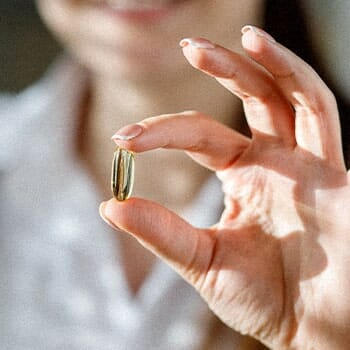Science has found that heart-healthy omega-3 unsaturated fats from fish oil supplements can provide numerous health benefits. However, these supplements can get spoiled faster than you might expect.
So, what happens when fish oils spoil – could it be harmful to your health?
To ensure safe use, you need to choose carefully the fish oil supplements to take. I've combined my experience as a nutritionist with an expert dietician and together, we answer the most common questions on the topic.
Keep reading to understand the signs of spoilage in fish oil supplements and learn how to select high-quality options for your health.
Quick Summary
- Fish oil can expire and be unsuitable for consumption due to improper storage or if its expiry date is due.
- A foul smell is one of the signs that your fish oil has expired when you open the container.
- Manufacturers state that most fish oil supplements have a shelf life of up to 2 years.
- In my opinion, it's wise to purchase fish oil supplements one-month supply at a time to prevent them from going stale and becoming unusable.
Do Liquid Fish Oil Supplements Expire?

Yes, liquid fish oil supplements can expire. They can become oxidized, rancid, and unsuitable for consumption even before their expiration date. It usually happens due to improper storage or when content is exposed to air, light, and moisture after opening.
“Light, heat and oxygen are the primary factors that influence degradation rate. Even stored in the dark, fish oil may oxidize unacceptably within 30 days of storage, according to a review published in the 2013 edition of the journal ‘BioMed Research International.’”
The oxidation can happen quickly, as soon as the bottle is opened and the supplement comes in contact with air.
It triggers chemical reactions in which the key omega-3 nutrients Eicosapentaenoic acid and Docosahexaenoic acid break down into lipid peroxides and further degrade to secondary by-products of oxidation such as cell-damaging aldehydes.
Later in this article, I'll show you some proper storage techniques to prevent fish oil from spoiling.
Comparison to Other Oils
It's interesting to note that when compared to oils like flaxseed and olive oil, fish oil has a relatively shorter shelf life and is more susceptible to oxidation.
While flaxseed oil also contains omega-3, olive oil is rich in monounsaturated fats and has a different oxidation threshold and a longer shelf life.
Do Fish Oil Capsules Expire?

Yes, fish oil capsules also expire.
According to studies, oxidation of fish oil may start within one month even if properly stored in a fridge or another cool, dark, and dry place at 39 degrees Fahrenheit, and despite the added antioxidants or other compounds that reduce oxidation and the see-through barrier all soft gels contain to stay fresh longer [1].
A study from the Journal of Nutritional Science has found that 50% of the tested supplements were below at least one of the safety standards for oxidation and determined that encapsulated, unflavored fish oil is the safest supplement form [2].
Since all fish oil supplements are highly prone to oxidation, I don't stock them for months, I always go for a one-month supply at a time.
Also, educating yourself is important to minimize the possibility of experiencing undesired side effects.
So, that’s why it matters to learn and fully understand:
- How to tell if fish oil capsules are rancid and oxidized
- How to properly store them
- The possible harmful effects of consuming expired and oxidized fish oil
How to Know if Your Fish Oil Has Expired?
Having been a regular user of fish oil supplements, I usually do the following to detect and prevent myself from buying and consuming an oxidized and expired product:
- Look into the “Best Before” date on the supplement package. If it’s out of date, my advice is to throw it away, but you may also take the following steps as most such products have a shelf life of 24 months from the production date.
- Run a quick product quality check. Purchase the supplement from a reputable company that sells high-quality products. Also, look for the third-party testing verification on the label that shows the product has met the quality standards and contains no contaminants or toxic compounds like mercury.
- Scan the capsule. Paying attention to whether it’s clear with a transparent, even, and springy coating and light golden color. If the pill is murky and soft, even soggy, it indicates that it’s not fresh and may be spoiled, so get rid of it.
- Open the bottle or break open the capsule to smell the oil inside. If you notice a whiff of sour, rotten fishy, or foul odor, it’s an indicator of rancidity. A more hands-on approach is to place a small amount of oil on a white paper or cloth. If it leaves a yellowish stain after evaporating, it's an indication of degradation.
- Finally, taste the supplement. If it tastes rancid, has a strong unpleasant flavor, or fishy aftertaste, it’s probably gone off, and you shouldn’t consume it.
How Long Does Fish Oil Last After The Expiration Date?
Fish oil supplements last two years after being manufactured. I'm my experience with the supplements, If the package remains unopened, packaged, and stored properly, I've found that it can last a few more weeks, perhaps months past their expiration before that foul smell becomes noticeable.
According to some supplement manufacturers, most fish oil supplements can last for two years after the date they’re made (even significantly after expiration) if unopened, packaged, and stored properly.
Related Article: Does Fish Oil Break a Fast
Is Rancid Fish Oil Harmful?
Yes, Rancid fish oils can be harmful and toxic even in small doses for some people. They cause reduced effectiveness and side effects such as heartburn, loose stools, and urinary tract infections.
According to my dietician, rancid oil can also cause:

- Increase certain risk factors for Alzheimer’s disease and atherosclerosis
- Have mutagenic effects
- Cause inflammation, high blood pressure, and high cholesterol levels
- Lead to organ damage
Especially in patients who have previously had a heart attack or suffered from any other heart disease [3] [4] [5].
Proper Storage Techniques
As previously mentioned, exposure to light, air, and moisture after opening the bottle triggers a chemical reaction that fast-tracks degradation.
I always advise my clients to keep their fish oil bottles in a cool, dark, and dry storage area. If you're refrigerating, ensure the bottle is tightly sealed to prevent moisture from getting into the bottle as this can accelerate rancidity.
FAQs
Should Fish Oil Be Refrigerated?
Once opened, liquid fish oil supplements should be refrigerated to slow down and reduce oxidation, whereas some liquid softgel capsules can be properly stored at room temperature but in a cool place without direct heat, moisture, or light exposure.
Can I Take Fish Oil After the Expiration Date?
Although it might not be deadly dangerous, I wouldn’t recommend taking fish oil after the expiration date as it’s less potent and won’t provide the expected health benefits (especially if it smells bad or appears slightly discolored because EPA and DHA, the essential omega-3 fatty acids from fish oil products, are highly susceptible to oxidation and can go rancid even before the valid conservative expiration date on the label).
Why Is My Fish Oil Cloudy?
Your fish oil supplement can become cloudy when it gets cooled in a refrigerator or freezer, just like olive oil or any other natural oil, because it contains a wide array of various fat types with different chemical structures that have different melting points.
How Do You Dispose of Expired Fish Oil Pills?
The best way to dispose of expired fish oil pills properly is to follow the specific disposal instructions on the supplement label.
References:
- https://www.hindawi.com/journals/bmri/2013/464921/
- https://www.ncbi.nlm.nih.gov/pmc/articles/PMC4678768/
- https://pubmed.ncbi.nlm.nih.gov/30529885/
- https://www.sciencedirect.com/science/article/abs/pii/S1098882316301678
- https://pubmed.ncbi.nlm.nih.gov/26642316/
About The Author
You May Also Like






